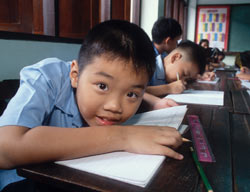
The UNESCO-UNEVOC International Centre: Who We Are | What We Do | Working With Us | Get in Touch
The UNEVOC Network: Learn About the Network | UNEVOC Network Directory
For Members: UNEVOC Centre Dashboard
Thematic Areas: Inclusion and Youth | Digital Transformation | Private Sector Engagement | SDGs and Greening TVET
Our Key Programmes & Projects: BILT: Bridging Innovation and Learning in TVET | Building TVET resilience | TVET Leadership Programme | WYSD: World Youth Skills Day
Past Activities: COVID-19 response | i-hubs project | TVET Global Forums | Virtual Conferences | YEM Knowledge Portal
Our Services & Resources: Publications | TVET Forum | TVET Country Profiles | TVETipedia Glossary | Innovative and Promising Practices | Toolkits for TVET Providers | Entrepreneurial Learning Guide
Events: Major TVET Events | UNEVOC Network News
 Global Action Week 2008 (21-27 April) focuses on quality education to end exclusion. A series of events have been organized to emphasize the importance of inclusive education as the only way to achieve Education for All, UNESCO’s absolute priority.
Global Action Week 2008 (21-27 April) focuses on quality education to end exclusion. A series of events have been organized to emphasize the importance of inclusive education as the only way to achieve Education for All, UNESCO’s absolute priority.
In addition, a new website on quality inclusive education will be launched for Global Action Week on UNESCO’s web portal, which is also hosting an online discussion forum on “Quality Education to End Exclusion.” The forum was opened on 1 April and will continue until 30 April.
Despite real progress since 2000 towards universal primary education, 72 million children are still not enrolled in school. Seventy percent of them live in sub-Saharan Africa or South and West Asia, but there are groups excluded from education in one way or another in all countries of the world.
Poverty and marginalization are major causes of exclusion. Children living in rural or remote communities and in urban slums have less access to education. Disabled children suffer from blatant exclusion and account for more than one third of all out-of-school children. Working children, those of indigenous populations and linguistic minorities, nomads and children affected by HIV/AIDS are also among the vulnerable groups. Some 37% of out-of-school children live in 35 states defined as fragile by the Organization for Economic Co-operation and Development (OECD) and this list does not include all countries in conflict and post-conflict situations.
“Global Action Week offers us an opportunity to highlight an unacceptable situation that is slowing progress towards the provision of education for all,” the Director-General, Mr Matsuura, said in the run up to the event. “It also provides an opportunity to signal clearly what needs to be done to address issues of marginalization and exclusion.”
To this end, UNESCO urges governments to identify children likely to stay out of school and those who are not reaching minimum mastery of the curriculum. In many developing countries, up to 40% of children perform at or below the lowest proficiency level in language and mathematics.
Strategies are also needed to address the causes of exclusion. Schooling must be affordable. Policies must enhance educational quality at all levels, in formal and in non-formal settings, and ensure that all children get into schools which provide them with programmes and practices that help them succeed. This means addressing and responding to the diversity of learners and developing appropriate teaching methods, curricula, and relations between schools, families and communities.
An inclusive curriculum favours the child’s cognitive, emotional and creative development. It is based on learning to live together – on fostering tolerance and promoting human rights, a powerful tool for transcending cultural, religious and other differences. Inclusive education respects the learner’s gender, cultural and linguistic identity - not only in textbooks but also through the attitude and expectations of teachers. It can be adjusted to meet individual needs so that all can benefit from a commonly accepted basic level of quality education.
The principle of inclusive education was adopted at the World Conference on Special Needs Education: Access and Quality (Salamanca, Spain, 1994). It was reiterated at the World Education Forum (Dakar, Senegal, 2000) and supported by the UN Standard Rules on the Equalization of Opportunities for Persons with Disabilities. Linking inclusion to broader development goals contributes to the reform of education systems, to poverty alleviation and to the achievement of the Millennium Development Goals.
1 Global Action Week is organized every year by the Global Campaign for Education (GCE), a UNESCO partner.
Author(s): UNESCO Media Advisory N°2008-26 Source:UNESCOPRESS 17-04-2008
Picture: © UNESCO/Olav A. Saltbones Making chores at Supawan School in Bangkok, Thailand. Inclusive education seeks to develop the full potential of every individual.